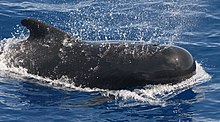| Pilot whales Temporal range: Pliocene to recent
| |
|---|---|

| |

| |
| Size of short-finned pilot whale compared to an average human | |
| Scientific classification | |
| Domain: | Eukaryota |
| Kingdom: | Animalia |
| Phylum: | Chordata |
| Class: | Mammalia |
| Order: | Artiodactyla |
| Infraorder: | Cetacea |
| Family: | Delphinidae |
| Subfamily: | Globicephalinae |
| Genus: | Globicephala Lesson, 1828 |
| Type species | |
| Delphinus globiceps[1] Cuvier, 1812
| |
| Species | |

| |
Exclusive range of short-finned pilot whale Exclusive range of long-finned pilot whale Regions of sympatry
| |
| Synonyms | |
|
Globicephalus | |
Pilot whales are cetaceans belonging to the genus Globicephala. The two extant species are the long-finned pilot whale (G. melas) and the short-finned pilot whale (G. macrorhynchus). The two are not readily distinguishable at sea, and analysis of the skulls is the best way to distinguish between the species. Between the two species, they range nearly worldwide, with long-finned pilot whales living in colder waters and short-finned pilot whales living in tropical and subtropical waters. Pilot whales are among the largest of the oceanic dolphins, exceeded in size only by the orca. They and other large members of the dolphin family are also known as blackfish.
Pilot whales feed primarily on squid, but will also hunt large demersal fish such as cod and turbot. They are highly social and may remain with their birth pod throughout their lifetime. Short-finned pilot whales are one of the few non-primate mammal species in which females go through menopause, and postreproductive females continue to contribute to their pod. Pilot whales are notorious for stranding themselves on beaches, but the reason behind this is not fully understood. Marine biologists have shed some light on the matter, suggesting that it is due to the mammals inner ear (their principal navigational sonar) being damaged from noise pollution in the ocean, such as from cargo ships or military exercises.[2] The conservation status of short-finned and long-finned pilot whales has been determined to be least concern.
- ^ Wilson, D. E.; Reeder, D. M., eds. (2005). Mammal Species of the World: A Taxonomic and Geographic Reference (3rd ed.). Johns Hopkins University Press. ISBN 978-0-8018-8221-0. OCLC 62265494.
- ^ "Sonic Sea". Brown Media Archives and Peabody Awards Collection, University of Georgia.